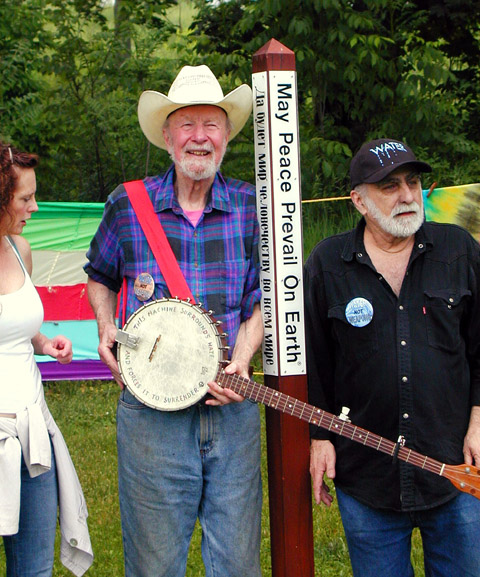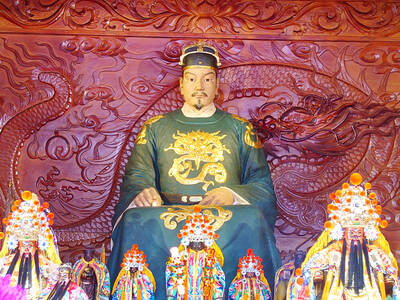Pete Seeger pulled his black Toyota Highlander into the Staples parking lot here and plucked some signs from the back seat, including one with “Peace” spray-painted in large orange letters. With that, he slung his banjo over his shoulder like an old musket and marched toward the intersection of Routes 9, a bustling six-lane thoroughfare, and 9D, the “Hudson Valley POW-MIA Memorial Highway.”
But before the 89-year-old folk singer flashed his anti-war signs to passing drivers from this no-man’s land — a patch of green about an hour north of New York City on the Hudson River — he bent over again and again, picking up litter.
“This is my religion now,” said Seeger. “Picking up trash. You do a little bit wherever you are.”

PHOTO: NY TIMES NEWS SERVICE
Seeger, the man behind the founding of the Clearwater Festival, which was held over the weekend at Croton Point Park, appeared there yesterday.
But for the last four years, most Saturdays he has been keeping his vigil in Wappingers Falls, New York.
He is usually not recognized by the hundreds of drivers who whiz by. It is a long road from 1969, when to protest the Vietnam War he sang John Lennon’s Give Peace a Chance at the foot of the Washington Monument.
“After two minutes, thousands were singing,” he recalled. “After three minutes, four minutes, a hundred thousand were singing. At the end of eight minutes, all five hundred thousand were singing.”
These days, fewer than a dozen protesters usually participate, while nearly as many who support the war in Iraq hold a counterdemonstration across Route 9. Seeger, a political activist who has traveled the world, rarely ventures farther than the few kilometers from here to his home in Beacon, New York. He stays close to his wife, Toshi Seeger, 85, who fractured vertebrae in a fall a few years ago.
On this particular Saturday, Seeger chatted easily with Chris Miller of Poughkeepsie. “He’s an ex-Army member,” Seeger said, “and they’re trying to send him over again.”
Miller, 38, served as a therapist for four years before receiving an honorable discharge in January 2006. But on Dec. 22, 2007, he said, he received orders to return to Iraq.
Miller said he had spent countless hours listening to Seeger’s stories, like the one about how his car windows were shattered in Peekskill in 1949 as he and his family left a performance he had given with the singer Paul Robeson, who was thought to have Communist sympathies. Or the one about the Vietnam veteran who said he had come to a concert in the Catskills to kill Seeger because of his anti-war stance, but was turned around by the performance and made his way backstage to tell of his transformation.
“I smiled and shook his hand,” Seeger said. “I had my banjo. We sat down and sang, Where Have All the Flowers Gone?” Afterward, Seeger said, the man told him, “I feel clean now.”
Seeger said he wrote that song in the mid-1950s accompanied by the same banjo he totes around today.
As for Miller: “Seeing what Pete has gone through and always standing up for what he believed in, despite the consequences, made my decision easier to resist the war. It made me comfortable that in the long run I’ll be all right.”
At one point, Seeger looked across the highway to the knot of counterdemonstrators. “They always have more flags,” Seeger said. “But our signs are more fun.” He said he crossed the street once about a year ago and talked to a veteran.
“I shook his hand and said, ‘I’m glad we live in a country where we can disagree with each other without shooting at each other.’ He had to shake my hand. He didn’t know what to say. I even picked up a little litter over there.”
He said that working for peace was like adding sand to a basket on one side of a large scale, trying to tip it one way despite enormous weight on the opposite side.
“Some of us try to add more sand by teaspoons,” he explained. “It’s leaking out as fast as it goes in, and they’re all laughing at us. But we’re still getting people with teaspoons. I get letters from people saying, ‘I’m still on the teaspoon brigade.’”

On a harsh winter afternoon last month, 2,000 protesters marched and chanted slogans such as “CCP out” and “Korea for Koreans” in Seoul’s popular Gangnam District. Participants — mostly students — wore caps printed with the Chinese characters for “exterminate communism” (滅共) and held banners reading “Heaven will destroy the Chinese Communist Party” (天滅中共). During the march, Park Jun-young, the leader of the protest organizer “Free University,” a conservative youth movement, who was on a hunger strike, collapsed after delivering a speech in sub-zero temperatures and was later hospitalized. Several protesters shaved their heads at the end of the demonstration. A

In August of 1949 American journalist Darrell Berrigan toured occupied Formosa and on Aug. 13 published “Should We Grab Formosa?” in the Saturday Evening Post. Berrigan, cataloguing the numerous horrors of corruption and looting the occupying Republic of China (ROC) was inflicting on the locals, advocated outright annexation of Taiwan by the US. He contended the islanders would welcome that. Berrigan also observed that the islanders were planning another revolt, and wrote of their “island nationalism.” The US position on Taiwan was well known there, and islanders, he said, had told him of US official statements that Taiwan had not

The term “pirates” as used in Asia was a European term that, as scholar of Asian pirate history Robert J. Antony has observed, became globalized during the European colonial era. Indeed, European colonial administrators often contemptuously dismissed entire Asian peoples or polities as “pirates,” a term that in practice meant raiders not sanctioned by any European state. For example, an image of the American punitive action against the indigenous people in 1867 was styled in Harper’s Weekly as “Attack of United States Marines and Sailors on the pirates of the island of Formosa, East Indies.” The status of such raiders in

As much as I’m a mountain person, I have to admit that the ocean has a singular power to clear my head. The rhythmic push and pull of the waves is profoundly restorative. I’ve found that fixing my gaze on the horizon quickly shifts my mental gearbox into neutral. I’m not alone in savoring this kind of natural therapy, of course. Several locations along Taiwan’s coast — Shalun Beach (沙崙海水浴場) near Tamsui and Cisingtan (七星潭) in Hualien are two of the most famous — regularly draw crowds of sightseers. If you want to contemplate the vastness of the ocean in true